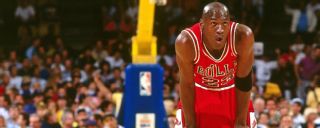|
EVEN THOUGH HE knew better, because he'd been in this same situation dozens of times before, Steph Curry, the consummate marksman and champion, who just 40 days earlier had been named the first unanimous MVP in NBA history, couldn't help himself. His reaction with 53 ticks left on the Game 7 clock in the 2016 NBA Finals, seconds after Kyrie Irving's surgical 3-point shot had fallen through the strings, was a primal, instinctive response to a lifetime spent swirling in a cauldron of competition and pressure: "I gotta go back at him." This, Curry would recognize later, was the incorrect course of action. But in the moment, pride overrode practical sensibilities. As he dribbled the ball up the floor, the pressure mounting with Irving in pursuit, Curry's hypothalamus, a small region of the brain located near the pituitary gland, sounded the alarm. When the body and mind are under duress, the hypothalamus instructs the adrenal glands to release cortisol and adrenaline, both stress hormones. This is what caused Curry's heartbeat to accelerate and his breath to quicken, sending blood rushing to the areas that needed it most, a way to protect his body in emergencies. That sensation was different from what Curry experiences before most big games, when, he says, he contends with butterflies that leave his stomach in turmoil. "It's an uneasy feeling," Curry says. "And it happens fast. It's not a steady progression. I experience it when I'm in the locker room, preparing to get locked in for a big game. "Because it matters so much. It's cliché, but if you aren't nervous, it doesn't matter enough to you." Earlier in Curry's career when the game was tight and he was on the bench, former Warriors assistant coach Keith Smart noticed that Curry's leg would quiver. "It was almost like a nervous twitch," Curry reports. Smart offered a suggestion to Curry: Purposely tense all the muscles in his body, hold it, feel the stress, then suddenly release. "You start with every muscle you think you can control in a neutral position, and then when you tighten them, I think your body thinks, 'Well, this is as stressed as your body can be,'" Curry explains. "So when you let all that go, maybe that's how the endorphins kick in. "I don't know if it was based on science or something [Smart] actually did as a player, but it worked." By the time June 19, 2016, rolled around, Curry had strayed from that exercise. As he focused on matching Kyrie tit for tat, teammate Draymond Green slid over with 44.2 seconds left to set a stout pick on Irving, forcing 7-footer Kevin Love to switch onto Curry. Curry's adrenaline surged. It was a mismatch he felt certain he could exploit. "When I was younger and got into those types of situations," Curry says, "it made me rush, play fast. With experience, you figure out ways to slow the game down." 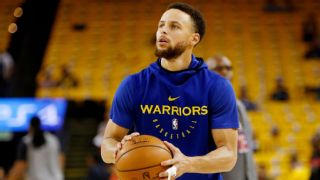 Curry pump-faked, created a sliver of separation, dribbled left, then crossed over to his right. The shot clock whittled down to four seconds and Curry, capitulating to the urgency, hoisted a 3 that bounced off the rim and out. "I'm like, 'I just need a little space' -- and that's where I started to rush," Curry says now. "I look back and think I could have easily gone around [Love] and gotten a 2, and we could have gotten a stop, and then I could come back down and hit another shot, and we win another championship, instead of me going for the hero shot, which I felt like I could make. "That was a shot where I was not under control. And it cost us a championship." As Curry walked off the court, simultaneously devastated and furious with himself, the Cleveland Cavaliers fell into a heap of celebration. Curry surveyed the scene before he departed; he remembers exactly what he was thinking. "Don't ever make the mistake of rushing like that again," he says.
CAN ELITE ATHLETES train to be impervious to pressure? Steph Curry thinks they can, and offers his dossier following that fateful 2016 June day as evidence. Since then, Golden State has won back-to-back championships and is positioned for a three-peat. In that time, Curry has drilled 61 clutch shots within the last five minutes of the fourth quarter or overtime, according to ESPN Stats & Information. His clutch ability and mental resolve were highlighted in a seminal 33-point second-half performance to eliminate the Houston Rockets in Game 6 of the Western Conference semifinals after he had gone scoreless in the first half. "I guess you can say the [2016] miss didn't haunt me," he says. Elite athletes fail. What makes them elite is they learn and grow from it. Think Earvin "Magic" Johnson dribbling out the clock and missing key free throws in the 1984 Finals against the Celtics and being branded "Tragic Magic" -- then returning the next season to lead the Lakers to the title over Boston, and thwarting the Celtics again in 1987 with a junior, junior hook that has become an enduring symbol of Johnson's greatness. Think LeBron James, who, as the Chosen One of the Heat, appeared passive and disconnected in the 2011 Finals against Dallas, gnawing on his fingernails as Miami blew a 2-1 series lead -- then embracing the role as the team's alpha and delivering two Heat titles, and one for Cleveland later. "Truly great ones know there's pressure, so they don't consider consequences," says Heat president Pat Riley, who coached Magic and ran the front office during LeBron's Miami tenure. "If they did, they'd cave all the time." Stress is a natural physical and mental reaction to life's challenges. Elite basketball stars shared with ESPN how stress manifested itself in each of them during critical moments. They experienced varying physical characteristics of that stress: For Michael Jordan, it meant palms that became so sweaty, he needed to apply repeated doses of rosin powder so he could grip the ball. For Larry Bird, it was a persistent nausea that would not subside until he hit the pregame layup line. How each of those stars mentally managed that stress, and in some cases thrived from it, has shaped their legacies. Ignore the consequences, as Riley suggests, and your career trajectory shoots upward. Succumb to those consequences, and you will never reach your potential. Just like with refining your shooting stroke, the more reps with pressure, the more your body will learn to cope. Irving sank the biggest jumper in Cavs history with great regard to the magnitude of the shot. It was important for him, he explains, to recognize the gravity of the moment, because that's when he feels most invincible. Irving claims the best players transform pressure into a potent weapon by utilizing a deep reservoir of belief in their own abilities. "Pressure to me is just a word describing fear," Irving says. "And when you go through the process of figuring life out, how important basketball is to you, and you release that fear and the circumstances and environment it exists in, you learn to embrace pressure. "I enjoy pressure. I look forward to it." Jerry West, for his part, systematically prepared his mind and body over a lifetime of training for clutch moments. West says he spent his childhood shooting baskets simulating the final seconds of a game. "I did it a million times as a kid," West says. "And I never failed, because I was the timekeeper. If I missed, I'd always put a second back on the clock." When West played in the NBA in the '60s, the shot clock didn't display fractions of a second. West didn't need it. He had created a permanent cadence in his brain. "I never had to look at the clock," he says. "I never felt pressure because it was ingrained in me how to make those shots." There is no data available regarding clutch shooting during West's playing days, but he contends during the 1969-70 season, when Wilt Chamberlain was out with a serious knee injury, that he connected on 12 game winners for Los Angeles (the Lakers' archives also make mention of this feat). Not everyone is able to corral stress. Former Orlando guard Nick Anderson infamously missed four free throws in the final 10 seconds of a 1995 Finals game that, he later conceded, destroyed his confidence -- and his career. Though DeMar DeRozan's story has yet to be fully written, one of the reasons the Raptors moved on from him, team sources have privately confirmed, was his tendency to falter in the playoffs, when his shooting and scoring numbers dipped. "Some guys in the league right now, their regular seasons are different than the playoffs," Jordan explains. "Why is that? Because it's a different kind of pressure. Those guys, when it gets stripped down, don't believe in themselves. They aren't sure they can hit the big shot, so they can't. It's a self-fulfilling prophecy." In the book Peak Performance, authors Steve Magness and Brad Stulberg argue that stress can serve as a stimulus for growth and adaptation. They liken the process of harnessing stress to lifting weights to add muscle. There is exertion, fatigue, recovery, then added strength. "If you have doubt or concern about a shot, or feel the 'pressure' of that shot, it's because you haven't practiced it enough," Jordan says. "The only way to relieve that pressure is to build your fundamentals, practice them over and over, so when game breaks down, you can handle anything that transpires. "I could beat you one-on-one, from the free throw line, or with a defensive stop. And if you put three guys on me, I'd beat you with a pass to my teammate for an easy open shot. "People didn't believe me when I told them I practiced harder than I played, but it was true. That's where my comfort zone was created. By the time the game came, all I had to do was react to what my body was already accustomed to doing." Jordan has converted some of the most iconic shots in basketball history, including 28 game winners. Twenty-seven of those came in the final 10 seconds of the game. But, like many of the champions interviewed for this story, there's one he missed that remains etched in his memory. It was in 1991, in his first trip to the Finals, against a Lakers team featuring Magic, James Worthy and Vlade Divac. With nine seconds left in Game 1, Jordan launched a wing jumper over the spindly arms of his former North Carolina teammate Sam Perkins. It felt perfect. Until it rolled around and out. 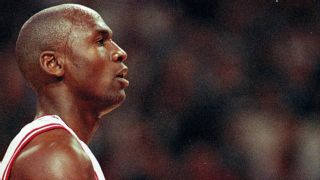 "Now, if you thought about it, that was a pretty big miss," Jordan says today. "It was my first-ever game in the Finals. I could have folded. "But I had no trouble bouncing back because I knew it was a good shot. I didn't rush it or short-arm it or anything. I just missed it." Jordan went on to average 32.9 points and shoot 55.8 percent from the floor in the series. The Lakers didn't win another game. "I believed every time out I was the best. And the more shots I hit, the more it reinforced that," Jordan says. "So, when you miss -- because no matter how great you are, you will miss -- you don't waver, because you've built yourself a nice little cushion of confidence. "Now, we've seen plenty of guys go the other way. They miss one shot and they can't seem to ever make one. That's the kind of negative reinforcement that ruins guys."
WHEN LEBRON JAMES signed with the Miami Heat in the summer of 2010, he declared that he, Dwyane Wade and Chris Bosh would win not one championship, not two, not three, not four, not five. Then, the 2011 Finals happened. The heavily favored Heat built a 2-1 series lead over the Dallas Mavericks, but imploded over the final three games. "We would have won that series had we not blown Game 2," Riley says. "We were ahead by 15 with six minutes to go and our guys were celebrating like we'd won the championship, LeBron included." In that series, LeBron's struggles in the final quarter were telling. He averaged just three points a game in the fourth quarter, missed eight of the nine 3s he took and shot 33.3 percent overall. Most distressing was his unwillingness to take the shot, averaging just 3.5 attempts in that final frame. It left him open to criticism that he was shying away from the moment. 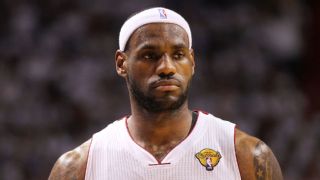 "LeBron is a great player," Riley says, "but before he came to us, he was banging his head against the wall like all great players that can't win. His first year [in Miami] was somewhat convoluted, from the standpoint of chemistry. As much as those guys talked around it, you had three significant players who never really got on the same page. They never let it fester, but they never spoke about it way they should have." The fallout from the Heat's collapse was vicious. James heard it all: choker, head case, front-runner. "In our exit meeting, LeBron was very dark," Riley recalls. "He didn't want talk at all about anything. "He was paralyzed in his own depression. But I wasn't worried. I could have said, 'Hey, big guy, call Magic Johnson. Tell him how it feels to hear people say you choked, that you didn't do the job.'" In his HBO series "The Shop," James admitted the 2011 Finals failure felt "like the world caved in." "I left that Finals like, 'Yo, Bron, what the f--- was you on, man? Like, you was overthinking everything. You didn't show up. You didn't do what you were supposed to do.' You know? And now you can't even sleep at night because you didn't give it all that you had." While outsiders declared James needed an appointment with a psychiatrist, Riley let his superstar stew. He felt confident that James' advisers, Rich Paul and Maverick Carter among them, would help their friend navigate this critical crossroad in his career. "They were tremendous," Riley says. "They knew how to love him and lift him up." To quiet his mind, James eschewed social media, nightclubs, the spotlight. He began reading more, devouring the entire Hunger Games series on road trips. He sat down for a candid conversation with his friend Wade and informed him he was done deferring. He found solace in the gym, and like so many before him -- Magic in the mid-'80s, Jordan years later -- began building scar tissue to protect himself from the mental scars of 2011. How that transpires is fascinating. There is a fatty substance formed in the central nervous system called myelin that enables nerve cells to transmit information faster and allow for more complex brain functions. Consider the first time a right-handed player tries to dribble with the left hand. It's awkward, clumsy. Initially, the nerves that fire off signals to complete that task are controlled in the front cortex of the brain. Over time, with countless repetitions, those nerve firings become more insulated. The myelin sheath builds up. Eventually, less effort is required to use that left hand, and the brain processes it as second nature. The same is possible with pressure, according to neurologists. With repetition, stress can be transformed into fortitude. James accomplished this in the wake of his biggest disappointment. "I was wearing a hat that I wasn't accustomed to," James said on "The Shop." "And I bought into it because, at that point of time in my life I was still caring about what other people thought. That moment shaped me for who I am today. "After that 2011 Finals, man, I was just like, that's never happening again. I may lose again. I may not win everything. But I will never fail at anything." When the Heat won in 2013, the most celebrated shot was Ray Allen's killer 3 from the corner. In 2016, when the Cavs finally became champions, it was Irving's thrilling jumper that resonated. But it's erroneous to suggest LeBron hasn't come through with big shots of his own. Since the Finals loss to the Mavericks, James has hit five buzzer-beaters, leaving him with seven overall in his career. Only Joe Johnson (eight) has hit more, per ESPN Stats & Information, which notes this data only includes performances since 2002. Moreover, James leads all players in game-tying/go-ahead field goals (10) in the final 24 seconds of the fourth quarter/overtime since analysts began tracking the data in 1996. His former teammate Allen (seven) and Kobe Bryant (seven) are the only others who are close.
FOR THE 2012 MIT Sloan Sports Analytics Conference, Justin Rao and Matt Goldman wrote a paper examining the impact of pressure on NBA performance. They used data from 1.3 million possessions to study two aspects of the game: offensive rebounding, an effort-based skill, and free throw shooting, which relies on mental tenacity and concentration. Rao and Goldman discovered that players shooting free throws in home games did worse in clutch situations than they did on the road due to what the authors called "detrimental self-focus." Their study concluded that when players attempt free throws in a hostile environment, they're more apt to rely on their instincts and muscle memory to complete the task. But when asked to take those same clutch free throws in the cozy confines of their own arenas, where hometown fans, friends and family are counting on them to succeed, players tend to overthink the shot, which, the authors contend, "disrupts the automatic ability to perform." Kevin Durant can relate. He was a sophomore at National Christian Academy in D.C. and a blossoming star after being relegated to mop-up duty the previous season. "I wanted to see my name in the paper," Durant says. "But when the time finally came, I wanted it so badly, I robbed myself of the moment." Durant's team was down by two to Montrose Christian (Durant would transfer there as a senior) in the final seconds of the game when Durant was fouled. As he stepped up to the line, he was suddenly lightheaded. His adrenaline was on overdrive, and no one had taught him yet that a few deep breaths would be helpful. "My mind was racing," Durant says. "'What happens if I miss? What happens if I make it? Will everyone love me?' You weigh the pros and cons. Nothing felt right. All I could think of was if I missed. I knew those feelings, and I knew I would drown in them." Durant, who went on to become an 88 percent career NBA free throw shooter, knew the second he released the free throw, there was no chance of it going in. He was too focused on the wrong things. "I was so upset with myself," Durant says. "You dream about those moments, but when you dream about them, you always make the shot. And it's never a free throw. "You have to work on making that small little tweak in your brain where your thoughts are empty and free. But you only learn that going through the tough times and the losses and the misses." 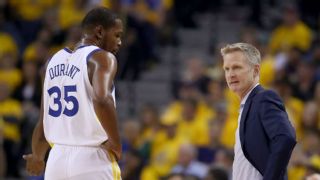 Golden State coach Steve Kerr believes both Durant and Curry are presently unmoved by pressure, something he could not say about himself as a complementary NBA player. "I was an overthinker," Kerr says. "And if your thoughts get in the way, you're screwed." Kerr, who played alongside Jordan, Scottie Pippen and Tim Duncan, says that after short-arming big shots with the Bulls, and having to absorb Jordan's ire, he took coach Phil Jackson's advice and turned to meditation to allow his natural shooting motion to dominate his mind, instead of all the apprehensive "what ifs." "I finally concluded, F--- It. If I get this ball, it's going up,'" Kerr says. "I went to an 'I don't care' approach instead of dwelling on all the repercussions." Kerr went so far as to write "FI" on his shoes. It was there in ink the night he hit the winner for the Bulls in Game 6 of the 1997 Finals, and later chronicled by Sports Illustrated writer Chris Ballard. Kerr says college coaches from across the country approached him to tell him their kids had adopted his methods. Kerr chuckled when he saw a newspaper photo of Butler star Shelvin Mack with "FI" scrawled on his sneakers. Kerr envies players like Jordan and Bird, who claimed they never suffered from doubt. Bird tells the story of his sophomore year in high school, when he broke his ankle and was languishing on the bench upon his return. Suddenly, his coach bellowed, "Bird!" "I wasn't ready to play," Bird recalls. "But I go in and I come off a screen and I hit a shot. I'm thinking to myself, 'I haven't played in five months and I can score already.'" By the time Bird went to the line for a 1-and-1 with 13 seconds left in the game and the score tied, his confidence was soaring. "I walked up and hit both shots," he says. "Never fazed me a bit. I always felt bad for the guys who stepped up there and lost their nerve."
ELITE BASKETBALL PLAYERS aren't immune to stress -- they've just mastered how to channel it. Today's players benefit from state-of-the-art assistance from their teams, including superior training facilities, extensive medical staffs, nutritionists, sports scientists, mental health counselors, sports psychologists, sleep experts, yoga instructors and meditation gurus. Yet the most valuable tool remains the inherent confidence that players know they have the skills to excel. "Great players know it's OK to fail," Riley says. "They don't succumb to the pressure, but sometimes they succumb to the narrative, especially today when it changes game to game, even quarter to quarter. "Look at the Boston Celtics. They beat Milwaukee in Game 1 of their series and they were the greatest. Then they lost four straight and now they suck. "It's what I call 'peripheral opponents.' If you allow yourself to succumb to that tremendous stress and anxiety, it's going to get in your head." Durant admits it has happened to him, even after winning back-to-back Finals MVPs in 2017 and 2018. It is, he says, a battle to block out the noise and maintain proper focus. "It's dreading that embarrassment in front of all these people," he explains. "We have such huge egos in the NBA because everyone has catered to us our whole life. When you fail in front of all these people, you get stuck on those who say, 'I told you so,' instead of the people who love and support you. "You can either drown in it or rise above it." 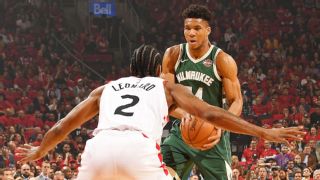 The NBA's brightest new star, Giannis Antetokounmpo, experienced his own healthy dose of stressful playoff basketball once his team fell behind 3-2 in the Eastern Conference finals to the Toronto Raptors, and the onus to save the Bucks' season landed squarely on his broad young shoulders. "It was never a topic for me when I came into the league because nobody expected much from me," Antetokounmpo says. "Pressure is earned." Antetokounmpo has already developed his own calming techniques. When he starts to feel jittery, he recalls his father's soothing words, that there's no need to be nervous about a game he has been playing his entire life. If he needs extra comfort, Giannis says, he rubs his wrists. Curry has found it helpful, when he's sitting on the bench, to visualize what he hopes to accomplish when he returns to the floor. He has also found that deep breaths slow him -- and the game -- down considerably. "What happened in 2016 was a hard lesson to learn," Curry says. "Kyrie had confidence before that shot, but that will live with him forever. Now, whenever he gets in a stressful situation, he can draw back on that." Durant draws back to the 2017 Finals, when he did his own share of deep breathing and meditation on the way to finding peace -- and excellence. He learned to block out the stress by turning off his phone, placing the Do Not Disturb sign on his door, disengaging from most people outside the team and focusing on a singular goal: winning in spite of himself. "The last thing I want when I play," Durant says, "is to be in my own way."
|


